- Home
- Harlan Ellison
Over the Edge/An Edge in My Voice Page 14
Over the Edge/An Edge in My Voice Read online
Page 14
But if he was going to do the dirty deed, for one or the other, well, to be honest, Arnold Steig’s offer really made his mouth water. Forty, fifty, maybe sixty grand…in the bag if he pushed Vera. It would leave him with a fat purse, even after Stockum had been fully paid off. It could be a lot of security, actually. Even the way he was living, it could last a year, two, maybe more, till he’d made a new connection. Breathing space. For the first time in his life, no more hustling, no more scuffling. But what if Arnold Steig refused to give him the money after Vera had been disposed of? What if? Either way, what the bloody hell if?
Then Charlie Kennoy had an epiphany. He could, indeed, eat his cake and have it, too.
When they paused for a break, he inched down to Vera.
“Arnold wants me to kill you,” he said.
“H-he w-what?”
“He wants me to shove you. If you don’t give me fifty thousand, I’m gonna do it. Yes, I believe I’m just gonna do it.”
“How? How can I get it? I don’t have any money with me? You can’t! You can’t do it, Charlie…I love you!”
He laughed roughly. “Love is fine, Vera, and maybe I’ll have time for it later. But right now I want to insure your…ah, what’s a polite way of putting it…oh, yeah: your good faith.”
She stared at him bleakly for a moment, the beautiful mouth twisting in disbelief. “How much did he offer you?”
“Forty thousand.”
“I haven’t got that much of my own—even at the chalet. I won’t have it till he’s dead.”
Kennoy laughed lightly. He couldn’t trust her after Arnold was dead. She could cut him off with nothing, just like that. “Then we’ll have to make other arrangements.” Savagely he pulled off one of her mittens. She closed her fist instinctively against the raw cold of the Alps, but he grasped her hand tightly, stared at it.
“Your rings will do nicely as a down payment,” he said. He yanked roughly at the diamond and ruby encrusted engagement and wedding bands, and she moaned at the pain. Her fingers were white and numb. But he kept working the jewelry off, abrading her flesh, and in a few moments the loot was in his hand.
“You can’t!” she wailed, above the wail of the wind. “They’re my wedding rings! They’re worth more than fifty thousand alone! Arnold will see they’re missing!”
“Not if you keep your gloves on,” he answered, throwing the mitten back at her. She put it on hurriedly. “And if you say they’re worth fifty, maybe I can hock them for twenty-five. Maybe. Anyhow, it’s a start.
“We’ll just say another five thousand a month from now on—how about it, Vera?”
She stared at him, and her face tightened with fury. “You sonofabitch!” All love, all goodwill had vanished in a a heartbeat. “You no-good fuckin’ ski-bum, you oughtta rot in hell, you scum sonofabitch.”
“Sticks and stones, my love.” He began to slip down past her to Arnold’s position. “See you back at the chalet, honey. And we can talk some more about the pain and betrayal of love.”
He laughed shortly, and she stared after him as he scooted on his butt, along the narrow sill, and lowered himself with clanking carabiners, down to her husband, clinging like lichen to the forty-degree tilt of the massif face.
He went to work on Arnold. With concealed pleasure.
“Vera wants me to kill you,” he said. “But if you can come up with about fifty thou now, I won’t tell her you want me to do the same, and I’ll give her the shove. On the other hand, if I spill the beans, Arnold, she’ll be able to sue you for every franc, pound, rial, zloty and dollar you’ve got!”
Steig’s face crumbled. He stared wordlessly at the mountaineer. Little fat man in pain. Finally he managed to cough out, “Surely, you aren’t serious?”
Charlie came close and looked straight into his face, holding the ice pick near: “I am a very serious fellah, Arnold.”
“But how? I don’t have any money with me!”
Kennoy’s face, a sharp look. “Have you got any valuables on you? Any rings? A watch?”
Steig clenched his jaws for a second, then slipped the tight elastic sleeve of the cagoule back, revealing a ruby-encrusted watch. It was an expensive chronometer, Vacherin Constantin, and Kennoy took but a moment to slip it off his pudgy wrist. Steig replaced his mitten, and muttered, “That watch is expensive, Kennoy. Will it do for a down payment? On the fifty thousand?”
Kennoy grinned wolfishly. “It’ll do dandy for a down payment. But not just on fifty thou. Let’s say, for a job this exacting, a job this unsettling to my psyche, how about ten grand a month for, oh what do you think, five years?”
Steig began to scream something at him, but Kennoy didn’t wait for an answer. He climbed back up, leaving Steig’s receding wail like a fart in the wind. He knew he had the wart in a corner, right where he wanted him. He’d collect the balance of the payoff when they got back to the chalet; and then he’d have a steady income…once Steig got into the rhythm of paying…for the rest of his life. Neither one of these filthy-rich assholes wanted the other to know about the death-plans each had cobbled up. It was a foolproof set-up for an enterprising young adventurer.
With the burden of decision off his mind, they began climbing again. Charlie found himself whistling into the wind.
The moment they gained the summit, both of Charlie’s potential employers unhooked the ropes and safety lines and retreated as far from him as the shallow cave permitted. The wind clawed mercilessly up here where there was no cover, unprotected, naked to the elements and the strong arms of a ski-bum that could wrap and throw you. Charlie had double-crossed them both, and neither was sure that he might not accept the other’s offer to kill.
He stared at them, sitting huddled together, talking, the wind still clawing at them through the cave mouth. Kennoy was certain they’d pay up. They sure as hell weren’t reconciling. Rats don’t reconcile. They knew he had too much on them. Rats fight over the cheese. And the cheese stands alone.
After all these years of being a chaser, a moocher, a pretty bird that followed the sun and the snow, never having anything that was really his own, nothing he hadn’t—somehow, someway—had to put out to get, years of having to be the houseguest, the fifth wheel, the bringalong buddy, days and nights living in his shoes without any place to remove them and put up his feet, of having to make do with only the sharpness of his mind and his good looks, he was finally coming into the big money! It felt good, tasty, invigorating. Like the climb.
He watched them as they got up and stretched. The poor saps! Particularly Vera, who had fallen for him. Like all the other damned dumb females in the world, a smart guy had outmaneuvered her. And there was probably still more rolling in the hay there—but he wouldn’t settle for anything less than the money.
They came toward him, walking with care across the slippery ice of the shallow cave. Probably coming to beg, one or the other.
“We’ve been thinking, Kennoy,” said Steig.
“Yes, we’ve been deciding something, Charlie,” Vera said.
“We still want to get rid of each other, but you’re too expensive. We’ve decided to try our luck elsewhere. Your services come too high.”
Kennoy stepped toward them, the wind of the ledge whistling past. “What do you two think you’re pulling? What d’you think, this is some kind of fucking negotiation? I’ve got you five-by-five in the tube. Give me any shit and I’ll tell the Swiss cops everything! This isn’t like the States; they take a very dim view of this kind of…” He felt the anger building in him. “You rather I’d do that? Or would you like me to carry out the job for one of you?” His face was flushed, and the anger rolled in his voice, as he saw the money fading before him. They were trying to double-cross him!
They kept coming forward, steadily.
“Just wait till I get down!” he said, almost snarling, the cold skinning back his lips from his teeth.
He reached for his ice staff, to hold it menacingly. He saw that it was no longer jacked
into the snow near the mouth of the cave. It was gone. But not far. It was in Vera’s hands.
They rushed him. Both of them. At the same moment. Together, for maybe the first time in their marriage. Fat little Arnold Steig hit him full in the diaphragm with bravado and a butting head. Charlie slammed back against the wall of the cave, and spun away from them. Spun away, right into Vera’s two-handed thrust of the ice staff. It went through his jacket, it went through his thermal sweater, it went through his rib cage. Charlie felt metal ingots being stamped out in his side. He screamed, and went blind with pain. His eyeballs exploded. His chest collapsed. His brain foamed and ran out of his mouth. The ice staff had scraped and torn something inside that he needed; he didn’t know what it was called, but he knew it was needed and it was ripped and shredded in there. The screaming went on, but neither the mountain nor the night gave a shit.
“You’ll get down, all right! And they’ll find you with our valuables! My rings, his watch! You shouldn’t have tried to rob us poor innocent tourists, you rat scum sonofabitch!” She jammed her booted foot against his thigh, shoved him away with the ice staff and wrenched it loose. Charlie screamed in pain.
Then they were chivvying him, shoving him, pushing him across the ledge, to the edge. Ice slipped under Charlie’s feet. His arms flailed into emptiness. And then, as he stepped off into space, into the wind, into the white veil of slanting crystals, he heard Vera shriek, “So long, Charlie, baby! Have a nice ride!”
He didn’t hear the last sentence. He was already falling from a great height, into the night and the cold and the waiting embrace of the mountain. And as he fell, he laughed to himself one last time. He had the killer point, he was the winner…
After all, Vera and her fat Arnold were still stuck with each other…forever. Even if they got off this assassin mountain; even if the cold didn’t get them; or the snow blindness; or they lost all their fingers and noses; even if they somehow survived the night and the storm; they were bound to each other forever, this scum bitch and this greasy little wart! I win! I win!
Thought Charlie Kennoy, still falling.
NIGHT VIGIL
Darkness seeped in around the little quonset. It oozed out of the deeps of space and swirled around Ferreno’s home. The automatic scanners turned and turned, whispering quietly, their message of wariness unconsciously reassuring the old man.
He bent over and plucked momentarily at a bit of lint on the carpet. It was the only speck of foreign matter on the rug, reflecting the old man’s perpetual cleanliness and almost fanatical neatness.
The racks of bookspools were all binding-to-binding, set flush with the lip of the shelves; the bed was made with a military tightness that allowed a coin to bounce high three times; the walls were free of fingerprints—dusted and wiped clean twice a day; there was no speck of lint or dust on anything in the one room quonset.
When Ferreno had flicked the single bit of matter from his fingers, into the incinerator, the place was immaculate.
It reflected twenty-four years of watching, waiting, and living alone. Living alone on the edge of Forever, waiting for something that might never come. Tending blind, dumb machines that could say Something is out here, but also said, We don’t know what it is.
Ferreno returned to his pneumo-chair, sank heavily into it, and blinked, his deep-set grey eyes seeking into the furthest rounded corner of the quonset’s ceiling. His eyes seemed to be looking for something. But there was nothing there he did not already know. Far too well.
He had been on this asteroid, this spot lost in the darkness, for twenty-four years. In that time, nothing had happened.
There had been no warmth, no women, no feeling, and only a brief flurry of emotion for almost twenty of those twenty-four years.
Ferreno had been a young man when they had set him down on The Stone. They had pointed out there and said to him:
“Beyond the farthest spot you can see, there’s an island universe. In that island universe, there’s an enemy, Ferreno. One day he’ll become tired of his home and come after yours.
“You’re here to watch for him.”
And they had gone before he could ask them.
Ask them: who were the enemy? Where would they come from, and why was he here, alone, to stop them? What could he do if they came? What were the huge, silent machines that bulked monstrous behind the little quonset? Would he ever go home again?
All he had known was the intricate dialing process for the inverspace communicators. The tricky-fingered method of sending a coded response half across the galaxy to a waiting Mark LXXXII brain—waiting only for his frantic pulsations.
He had known only that. The dialing process and the fact that he was to watch. Watch for he-knew-not-what!
There at first he had thought he would go out of his mind. It had been the monotony. Monotony intensified to a frightening degree. The ordeal of watching, watching, watching. Sleeping, eating from the self-replenishing supply of protofoods in the greentank, reading, sleeping again, re-reading the bookspools till their casings crackled, snapped, and lost panes. The re-binding—and re-re-reading. The horror of knowing every passage of a book by heart.
He could recite from Stendhal’s LE ROUGE ET LE NOIR and Hemingway’s DEATH IN THE AFTERNOON and Melville’s MOBY DICK, till the very words lost meaning, sounded strange and unbelievable to his ears.
First had come living in filth and throwing things against the curving walls and ceilings. Things designed to give, and bounce—but not to break. Walls designed to absorb the impact of a flung drink-ball or a smashed fist. Then had come the extreme neatness, then a moderation, and finally back to the neat, prissy fastidiousness of an old man who wants to know where everything is at any time.
No women. That had been a persistent horror for the longest time. A mounting pain in his groin and belly, that had wakened him during the arbitrary night, swimming in his own sweat, his mouth and body aching. He had gotten over it slowly. He had even attempted emasculation. None of it had worked, of course, and it had only passed away with his youth.
He had taken to talking to himself. And answering himself. Not madness, just the fear that the ability to speak might be lost.
Madness had descended many times during the early years. The blind, clawing urgency to get out! Get out into the airless vastness of The Stone. At least to die, to end this nowhere existence.
But they had constructed the quonset without a door. The plasteel-sealed slit his deliverers had gone out had been closed irrevocably behind them, and there was no way out.
Madness had come often.
But they had selected him wisely. He clung to his sanity, for he knew it was his only escape. He knew it would be a far more horrible thing to end out his days in this quonset a helpless maniac, than to remain sane.
He swung back over the line and soon grew content with his world in a shell. He waited, for there was nothing else he could do; and in his waiting a contentment grew out of frantic restlessness. He began to think of it as a jail, then as a coffin, then as the ultimate black of the Final Hole. He would wake in the arbitrary night, choking, his throat constricted, his hands warped into claws that crooked themselves into the foam rubber of the sleeping couch with fierceness.
The time was spent. A moment after it had passed, he could not tell how it had been spent. His life became dust-dry and at times he could hardly tell he was living. Had it not been for the protected, automatic calendar, he would hardly have known the years were passing.
And ever, ever, ever—the huge, dull, sleeping eye of the warning buzzer. Staring back at him, veiled, from the ceiling.
It was hooked up with the scanners. The scanners that hulked behind the quonset. The scanners in turn were hooked up to the net of tight inverspace rays that interlocked each other out to the farthest horizon Ferreno might ever know.
And the net, in turn, joined at stop-gap functions with the doggie-guards, also waiting, watching with dumb metal and plastic minds for that implacab
le alien enemy that might some day come.
They had known the enemy would come, for they had found the remnants of those the enemy had destroyed. Remnants of magnificent and powerful cultures, ground to microscopic dust by the heel of a terrifying invader.
They could not chance roaming the universe with those Others somewhere. Somewhere…waiting. They had formed the inverspace net, joining it with the doggie-guards. And they had hooked the system in with the scanners; and they had wired the scanners to the big, dull eye in the ceiling of the quonset.
Then they had set Ferreno to watching it.
At first Ferreno had watched the thing constantly. Waiting for it to make the disruptive noise he was certain it would emit. Breaking the perpetual silence of his bubble. He waited for the bloodiness of its blink to warp fantastic shadows across the room and furniture. He even spent five months deciding what shape those shadows would take, when they came.
Then he entered the period of nervousness. Jumping for no reason at all, to stare at the eye. The hallucinations: it was blinking, it was ringing in his ears. The sleeplessness: it might go off and he would not hear it.
Then as time progressed, he grew unaware of it, forgot it existed for long periods. Till it had finally come to the knowledge that it was there; a dim thing, an unremembered thing, as much a part of him as his own ears, his own eyes. He had nudged it to the back of his mind—but it was always there.
Always there, always waiting, always on the verge of disruption.
Ferreno never forgot why he was there. He never forgot the reason they had come for him. The day they had come for him.
The evening had been pale and laden with sound. The flits clacking through the air above the city, the crickets in the grass, the noise of holograph from the living room of the house.

 Repent, Harlequin! Said the Ticktockman
Repent, Harlequin! Said the Ticktockman Broken Glass
Broken Glass Other Glass Teat
Other Glass Teat Memos From Purgatory
Memos From Purgatory I Have No Mouth and I Must Scream
I Have No Mouth and I Must Scream The Deadly Streets
The Deadly Streets The Glass Teat
The Glass Teat Paingod and Other Delusions
Paingod and Other Delusions No Doors No Windows
No Doors No Windows Strange Wine
Strange Wine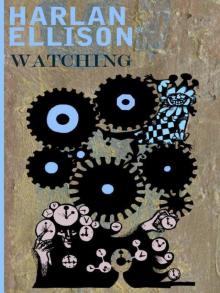 Harlan Ellison's Watching
Harlan Ellison's Watching Over the Edge/An Edge in My Voice
Over the Edge/An Edge in My Voice Troublemakers: Stories by Harlan Ellison
Troublemakers: Stories by Harlan Ellison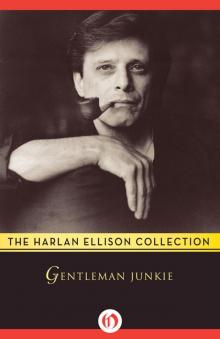 Gentleman Junkie and Other Stories of the Hung-Up Generation
Gentleman Junkie and Other Stories of the Hung-Up Generation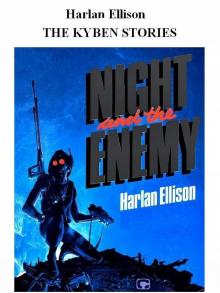 The Kyben Stories
The Kyben Stories From the Land of Fear
From the Land of Fear The Top of the Volcano: The Award-Winning Stories of Harlan Ellison
The Top of the Volcano: The Award-Winning Stories of Harlan Ellison Sleepless Nights in the Procrustean Bed
Sleepless Nights in the Procrustean Bed Ellison Wonderland
Ellison Wonderland Children of the Streets
Children of the Streets Can & Can'tankerous
Can & Can'tankerous Love Ain't Nothing but Sex Misspelled
Love Ain't Nothing but Sex Misspelled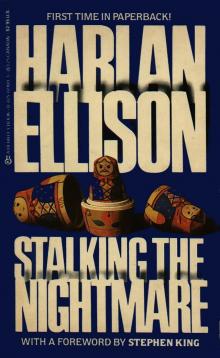 Stalking the Nightmare
Stalking the Nightmare Approaching Oblivion
Approaching Oblivion Deathbird Stories
Deathbird Stories Partners in Wonder
Partners in Wonder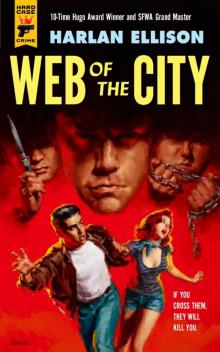 Web of the City
Web of the City Spider Kiss
Spider Kiss A Boy and His Dog
A Boy and His Dog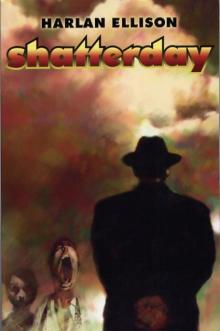 Shatterday
Shatterday Slippage: Previously Uncollected, Precariously Poised Stories
Slippage: Previously Uncollected, Precariously Poised Stories Repent, Harlequin! Said the Ticktockman
Repent, Harlequin! Said the Ticktockman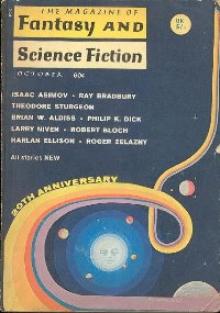 Come to Me Not in Winter's White
Come to Me Not in Winter's White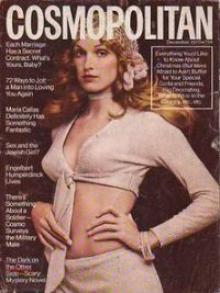 The Song the Zombie Sang
The Song the Zombie Sang The Other Glass Teat
The Other Glass Teat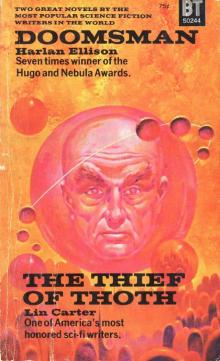 Doomsman - the Theif of Thoth
Doomsman - the Theif of Thoth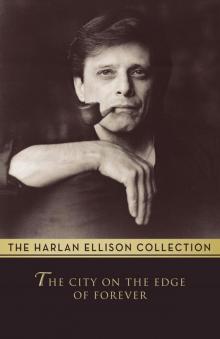 The City on the Edge of Forever
The City on the Edge of Forever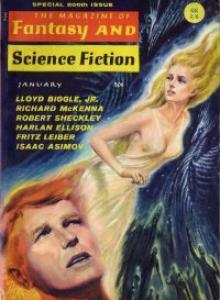 I See a Man Sitting on a Chair, and the Chair Is Biting His Leg
I See a Man Sitting on a Chair, and the Chair Is Biting His Leg The Harlan Ellison Hornbook
The Harlan Ellison Hornbook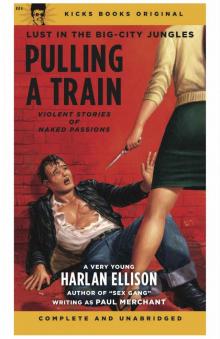 Pulling A Train
Pulling A Train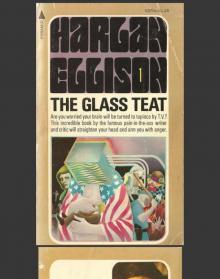 The Glass Teat - essays of opinion on the subject of television
The Glass Teat - essays of opinion on the subject of television An Edge in My Voice
An Edge in My Voice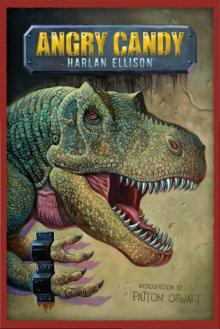 Angry Candy
Angry Candy Troublemakers
Troublemakers The Top of the Volcano
The Top of the Volcano Over the Edge
Over the Edge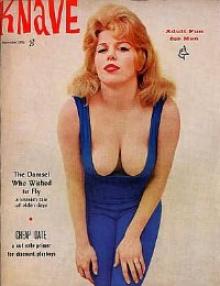 Survivor #1
Survivor #1 Slippage
Slippage